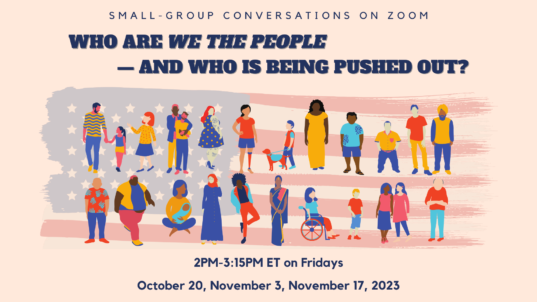
Image by Sarah Richter from Pixabay
How might we encourage greater empathy in discussions?
Professor Amanda Hooper liked to use discussion groups in her social science course. These usually worked well. But she was troubled by a recent development. Several of her discussion groups had students who essentially were hijacking the discussions to promote their political views. Some spouted conservative views, others liberal, some progressive and some libertarian. The hijacking students came to class very well prepared with talking points on the subject of the discussion. They were dominating the discussions sessions, making it impossible to have a real interchange of ideas. They were ruining the exploratory value of the discussions for other students.
Hooper decided to counter this trend by creating avatars to represent different citizens who represented a cross section of society. She asked the discussion facilitators to assign avatars to students whose usual comments would differ from those you might expect from the avatar. Then she asked all students to discuss the topic from the point of view of the avatar they were assigned.
The discussions went better than expected. They were deeper in insight because students really were trying their best to represent faithfully the views that might represent their avatars.
What especially surprised her was the response from the hijackers. They really seemed to enjoy the experience. When she asked one of the hijackers about this, she was amazed at the response: “You know, I really am tired of being a talking-point conveyor. It was nice trying to understand how others think. I’m not sure if this changed my political views, but I’m much more respectful of how others think.”
As the semester progressed, Hooper continued to use the avatar approach. She asked the facilitators to switch the avatar assignments so every student would get the experience of expressing likely views of someone different from themselves. She also asked students to flesh out the avatar descriptions. By the end of the semester these became fully developed and realistic personae.
The saying about the need to “walk a mile” in someone’s shoes may be old, but its sentiment is more and more important in our society. We need tools to encourage empathic thinking. We also need environments where the genuine sharing of alternative perspectives is not only encouraged but protected. Our classroom should offer such an environment.
How might we encourage greater empathy in our classrooms, and ultimately in our society? How can we foster calm exploration of divergent views rather than the simple assertion of competing talking points? What role might the use of avatars play in extending our moral imaginations in ways that expand the points of view we incorporate into exploratory discussions? You can find tips for Avatar Discussions in IF’s Teaching Tips for Classroom Discussions.
* * *
I think we all have empathy. We may not have enough courage to display it. – Maya Angelou
This post is part of our “Think About” education series. These posts are based on composites of real-world experiences, with some details changed for the sake of anonymity. New posts appear Wednesday afternoons.



